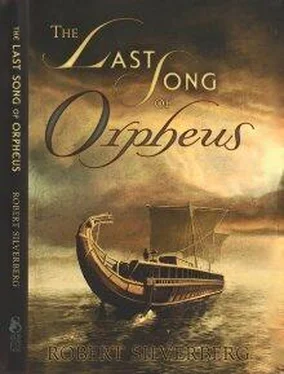Now the worship of Dionysus is valuable up to a point, as the worship of any god is valuable. Through his Mysteries it was possible to find that gateway into the deeper reality that is the goal of all worship. I myself had sung songs of the birth of Dionysus, Zeus’s son by Persephone, whom Zeus had meant one day to be his own successor. I told how in the early days of the world the Titans, those old sulking overthrown gods, the rebellious children of Uranus, grew jealous of the upstart child’s glory and fell upon him and tore him apart, and even fed on the flesh of his sundered limbs, though Athena was able to rescue his heart, from which Zeus caused Dionysus to be born again. Zeus in fury destroyed the Titans then with a thunderbolt, and from their ashes the race of mortal men arose. All this was a story of the eternal cycle of death and rebirth that underlies all existence. Dionysus the immortal god who dies, Dionysus the resurrected, was the spirit of life against which the forces of death unceasingly contend. One sings of such stories, not because they are the literal truth, but because they cast the light of truth over the deep realities of the world.
But, over the years, the Dionysiac cult of my people had grown wilder and bloodier, until its frenzy reached such a crazed pitch that it obscured rather than revealed those truths that all of us strive to comprehend, and truth became imprisoned in that obscurity. It was my task in Thrace to untwist the chains that had come to tie the hidden soul of harmony.
In our land the chief worshippers of the resurrected god were women, who called themselves Bacchantes, for Bacchus was one of Dionsyus’ innumerable names, but they also were known as maenads, or raving ones, to those who took them to be madwomen. Certainly their way of giving praise to their god was a ferocious one. Clad in goatskins and bedecking their hair with snakes, they raged wild-eyed through the countryside with painted faces, playing harsh music on shrill flutes, beating on drums and cymbals and jangling tambourines, waving pine torches aloft, uttering piercing bloodcurdling shrieks, ripping apart whatever lay in their path. Their minds were blurred by wine and the fumes of incense, and in their ecstasies they bade farewell entirely to reason and rampaged like an uncheckable force. At the climax of their rites they would fall upon a bull, which they believed to be the incarnation of their Dionysus, and tear the beast asunder with their hands, devouring its raw flesh by way of attaining union with the god.
Often did I see our maenads trooping back afterward from the forest, their cheeks and forearms smeared horribly with the blood of the sacrificed bull. They were already growing calmer, their passions spent, but still were half lost in a transport of holy fervor. The leader of these Bacchantes was named Hesione, my own kinswoman, the daughter of my father’s brother. Her perpetual companion was scarlet-haired Phorixo, a woman who stood nearly as tall as any man, and with them often was soft-faced Carya, younger than the other two, a practitioner of the healing arts. In the daily life of the city these women were, all three, tender and loving wives and mothers, adept in the skills of the household, and, as I have said, Carya was also one who could knowledgeably minister to those in pain. But they were devotees of Dionysus as well, and when the fit was on them they were frightening to behold, wholly caught up in the mad rampages by which they honored their god.
“Look at these,” I would say to Hesione, showing her the portraits of Dionysus and Apollo that stood in our temple. “Can you not see that one is the mirror image of the other? These gods are one and the same, Hesione.”
“They are nothing like each other,” she would reply.
“Each represents one aspect of the whole,” I told her then. “Dionysus is fiery energy; Apollo is calmness and sanity. Our goal should be to unite the two in one.”
“And have you done that? You ignore Dionysus entirely. You are merely Apollo’s creature. And you anger Dionysus greatly, Orpheus, through your neglect of him.”
“No,” I said. “Not so. In my music I worship him as deeply as you do. My music contains both Apollo and Dionysus, or it would not have the power to move the soul.”
She could not be swayed. Her voice was crisp with scorn. “Your music comes entirely from Apollo, whatever you may say. It lacks the fire of Dionysus.” And she laughed. “Come with us, some day, to the mountainside, and hear the sounds of our flutes and cymbals and drums, and then you will learn what true music is.”
I smiled at that. “I think I know what true music is. And also I know that the true Dionysus is the force of creation, brought to us by Zeus as the bearer of life—not, as you women would have it, of mindless destruction. But let that pass. You say I should come with you to your revels and learn the truth of your beliefs. But do you mean that? Would you really want a man present at your feast, Hesione? Admit it, cousin: when the full madness is upon you, you detest all men, and would tear any man apart who went near you!”
“You say we detest men? You, who loathe all womankind so much that you take only handsome youths as your lovers?”
I reminded her of my love for Eurydice, whom I still mourned in songs that made all the world weep. If I had turned to members of my own sex for the comforts of love after the death of Eurydice—and it was true; I had, many times—it was only because no other woman in the world could ever have been to me what Eurydice was. But that in itself only angered Hesione all the more, for she saw it as a rejection of her entire sex. I could do nothing against such a belief. Nor could I pry her loose from her conviction that the Dionysus of the maenad frenzies was the true Dionysus.
I knew, as I have always known, that only by becoming Dionysus myself, only through my dying and being reborn even as he was slain and born again, could I break through the wall of her madness and the madnesses of her cult. By that sacrifice, and by it alone, would I be able to return my people to the essential way of harmony. Gods must die—and there is a part of me that is a god—to lead their people onward to the truth.
I was prepared for it. I had prepared for it all my life. By dying as in their fables Dionysus himself had died, I would become Dionysus for them, and they would worship me as they had worshipped him, and Dionysus and Apollo would at last be united in their minds.
And so—and so—when the day came—“The maenads are dancing in the forest, Orpheus,” said one of the men of my court. “You must go to them and calm them with your music, or they will destroy us all!”
“Yes,” I said. “I must go to them.”
I heard the strident screeching of their flutes long before I saw them, the pounding of their drums, the penetrating outcry. Then they came into view, dozens of them, racing wild-eyed across the meadow, their painted faces shining, their serpent-threaded hair unbound and streaming behind them, their animal-skin garments hanging open. How crazed they were! How far gone in their frenzies, how maddened by love of their god!
Here was beautiful Hesione, face smeared with blood and distorted into a terrible grimace, eyes so glazed she scarcely seemed to recognize me.
“Do you know me, Hesione?” I asked, holding my lyre aloft. “I am Orpheus. Come, Hesione. Listen to my song.”
I could tell that she had no idea who I was. She scooped up a strand of ivy and held it beckoningly toward me, as though she meant to bedeck my shoulders with it as one would bedeck a bull being made ready for the sacrifice. From her crimson lips came a strange bellowing sound that no one would know for the voice of a woman.
Beside her at the front of the pack was tall scarlet-haired Phorixo, altogether lost in the raptures of her rite, and next to her gentle Carya the healer, but she was not so gentle now, for the blood of beasts ran down her arms and shoulders, and dripped from the tips of her bared breasts. Carya, at least, knew me. “So there you are, Orpheus! You who scorns us all, come to mock us!”
Читать дальше












